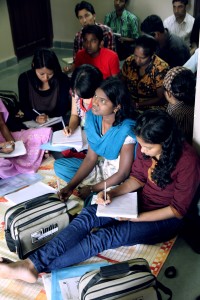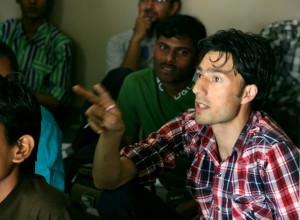I just arrived in Video Volunteers at the beginning of the week. I will intern in the NGO for 6 months. Since I will work on the India Unheard project, meeting the Community Correspondents (CCs) was very important to me. It was the occasion for very rich encounters, and a way to understand the deep values under Video Volunteers' projects. I followed the morning sessions, and witnessed how much the CCs changed, evolved and learned throughout the training. This is what I report in this blog.
 It has now become a daily routine. The day starts with watching and discussing the quality of videos realised by diverse Community Correspondents. Devidas Gaonkar, a Community Correspondent from Goa, who has worked as a filmmaker in video Volunteers for two years now, has realised the two videos the CCs watched this morning. The CCs have to give their feedback on the video. They make several criticisms, thus showing how much their way of looking at videos have evolved throughout the training.
It has now become a daily routine. The day starts with watching and discussing the quality of videos realised by diverse Community Correspondents. Devidas Gaonkar, a Community Correspondent from Goa, who has worked as a filmmaker in video Volunteers for two years now, has realised the two videos the CCs watched this morning. The CCs have to give their feedback on the video. They make several criticisms, thus showing how much their way of looking at videos have evolved throughout the training.
Addressing development to get one's rights granted
Stalin then opened the session on development. He starts listing on the white boards all the development government schemes existing in India. The CCs mentions programs related to water, toilet, house and road construction, electricity, transport, telecommunications, industries. A long list of development programs soon came out.
The CCs are asked to tell how many schemes are actually implemented in their areas. Most of them realised that they are not aware of more than 5. So, they need to research, to know which programs are existing and relevant in their areas. Here, more than mere journalists, they need to behave as citizens, aware of their rights and fighting for them. Stalin underlines that they have to use the Right to information act, in order to know their rights, and that the have to understand how the programs are working, what the different departments in charge. They also have to be able to read the budget. this is how they can have the chance to get the programs implemented fairly.
He then asked them to tell what percentage of the state budget, the field education, health and defence represents in state government. This soon turns into an exercise for the CCs. They have to be creative, and to find a way to get this information. Thus, they have to find the right informant. Stalin wants them to be aware that they have everything in their hands, they just have to learn where to find the information.
The Community Correspondents now have to break down the development theme in story ideas. Stalin reminds that how they have to construct their story. Sajan proposes a story : he is interested in making a video about power projects in Kashmir. Indeed, there are several such project in Kashmir, but the power is rarely used in the region, with faces a drastic lack of electricity. Stalin insists: what is interesting is not power projects in general, but a particular project Sajan is familiar with. Sajan knows a dam near his place: the Branwar project. He has a vague idea of how much has been spent on the project, and knows that it has been planned that 1200MW would be kept for the use of Kashmir people. Stalin helped them making the calculation: this actually means that there would be enough electricity for 5 villages. The CCs understand that they have to be careful of numbers, figures and statistics. They should better break them down into numbers that relate to their lives. They have to be aware of what is really at stake in development programs, in order to ensure that they are fair.
Discussing technology : a change in everyone's life
 The technology session starts in the usual way: the Community Correspondents have to give their ideas on the topic. Doing so, they realise how much they know, and that they possess a lot of material to make their video. Thn, CCs are given 30 seconds to list in their minds all the technologies they know around them. They mention mobile phone, camera, fridge and computer, lighter, fax, radio, and lot more. Many technologies are discussed. In particular, the mobile phone stroked a heated discussion, since it has brought tremendous change in everyone’s lives. The discussion goes on about fridge, Tv, so the CCs have to mobilise their daily experience and reflect on it. From there, they can start imagining video stories, that are rooted in their community experience. The discussion goes with internet, and CCs realised that several technologies have profoundly impacted their lives in the last years. At the end of the session, the CCs have constructed new ways of apprehending the technologies surrounding us, and now see stories in their experience.
The technology session starts in the usual way: the Community Correspondents have to give their ideas on the topic. Doing so, they realise how much they know, and that they possess a lot of material to make their video. Thn, CCs are given 30 seconds to list in their minds all the technologies they know around them. They mention mobile phone, camera, fridge and computer, lighter, fax, radio, and lot more. Many technologies are discussed. In particular, the mobile phone stroked a heated discussion, since it has brought tremendous change in everyone’s lives. The discussion goes on about fridge, Tv, so the CCs have to mobilise their daily experience and reflect on it. From there, they can start imagining video stories, that are rooted in their community experience. The discussion goes with internet, and CCs realised that several technologies have profoundly impacted their lives in the last years. At the end of the session, the CCs have constructed new ways of apprehending the technologies surrounding us, and now see stories in their experience.
Video Volunteers Fixing the Gap between Community and Government
Our community correspondents operate as citizen journalists in their own community and bring the issues to the larger world through video reports. As a part of this process of transformation, we include government officials to play an important part.
Badlav Pe Charcha- Fixing India story of change
Chai pe charcha aur Pareeksha pe charcha ke baad aaj hum kar rahe hain Badlav pe charcha! Fixing India ke Is season ke akhiri episode mein hum jaanegnge ki badlaav pe humare kaam ki shuruat kab aur kaise hui aur is par kis tarah kaam hota hai.
